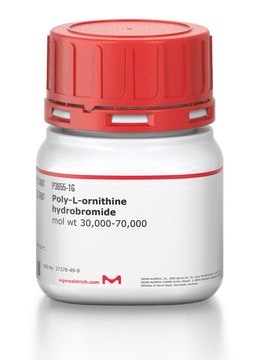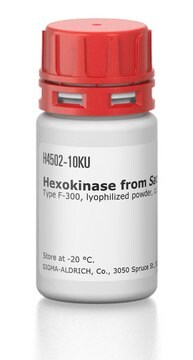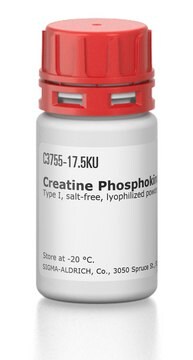S0937
Sucrose Phosphorylase
recombinant, expressed in E. coli, lyophilized powder, ≥45 units/mg solid
Synonym(s):
SPase, disaccharide glucosyltransferase, sucrose glucosyltransferase, Sucrose:orthophosphate α-D-glucosytransferase
Sign Into View Organizational & Contract Pricing
All Photos(1)
About This Item
CAS Number:
MDL number:
UNSPSC Code:
12352204
NACRES:
NA.54
Recommended Products
recombinant
expressed in E. coli
form
lyophilized powder
specific activity
≥45 units/mg solid
mol wt
56 kDa by SDS-PAGE
shipped in
wet ice
storage temp.
−20°C
General description
Research area: Cell signaling
Sucrose Phosphorylase belongs to glycoside hydrolase, GH13 family. It comprises of four domains with the glucose anomeric carbon-binding site and a glucoside-binding site. The active site residues include Asp192 and Glu232. It is majorly produced by bifidobacteria and lactic acid bacteria. The cross-linked sucrose phosphorylase aggregates is thermostable and could be exploited for industrial catalysis of glycosylation.
Sucrose Phosphorylase belongs to glycoside hydrolase, GH13 family. It comprises of four domains with the glucose anomeric carbon-binding site and a glucoside-binding site. The active site residues include Asp192 and Glu232. It is majorly produced by bifidobacteria and lactic acid bacteria. The cross-linked sucrose phosphorylase aggregates is thermostable and could be exploited for industrial catalysis of glycosylation.
Application
Sucrose Phosphorylase has been used in sucrose determination in wheat plant and in sucrose hydrogen production.
Sucrose phosphorylase has been used:
- To assess the enzymatic synthesis of stable, odorless, and powdered furanone glucosides.
- To investigate the novel transglucosylating reaction with carboxylic compounds.
- In sucrose determination in wheat plant and in sucrose hydrogen production.
Biochem/physiol Actions
Sucrose phosphorylase catalyzes the reversible conversion of sucrose (α-D-glucopyranosyl-1,2-β-D-fructofuranoside) and phosphate into D-fructose and α-D-glucose 1-phosphate. This reaction plays a crucial role in generating the vital glucose component through sucrose metabolism.(1)
Unit Definition
One unit will produce 1.0 μmole of D-fructose from sucrose per min with the corresponding reduction of NADP to NADPH at pH 7.6, at 25 °C.
Physical form
Contains sucrose as stabilizer.
Signal Word
Danger
Hazard Statements
Precautionary Statements
Hazard Classifications
Resp. Sens. 1
Storage Class Code
11 - Combustible Solids
WGK
WGK 3
Certificates of Analysis (COA)
Search for Certificates of Analysis (COA) by entering the products Lot/Batch Number. Lot and Batch Numbers can be found on a product’s label following the words ‘Lot’ or ‘Batch’.
Already Own This Product?
Find documentation for the products that you have recently purchased in the Document Library.
Customers Also Viewed
Thornthan Sawangwan et al.
Organic & biomolecular chemistry, 7(20), 4267-4270 (2009-10-02)
Regioselective glucosylation of R-glycerate catalysed by sucrose phosphorylase in the presence of sucrose as the donor substrate provided the natural compatible solute (R)-2-O-alpha-D-glucopyranosyl glycerate with complete regioselectivity in an optimised synthetic yield of 90% R-glycerate converted and a concentration of
A Kasperowicz et al.
Journal of applied microbiology, 107(3), 812-820 (2009-03-27)
To verify the taxonomic affiliation of bacterium Butyrivibrio fibrisolvens strain A from our collection and to characterize its enzyme(s) responsible for digestion of sucrose. Comparison of the 16S rRNA gene of the bacterium with GenBank showed over 99% sequence identity
Sucrose phosphorylase harbouring a redesigned, glycosyltransferase-like active site exhibits retaining glucosyl transfer in the absence of a covalent intermediate.
Christiane Goedl et al.
Chembiochem : a European journal of chemical biology, 10(14), 2333-2337 (2009-08-20)
Structural rearrangements of sucrose phosphorylase from Bifidobacterium adolescentis during sucrose conversion
Mirza O, et al.
The Journal of Biological Chemistry (2006)
Christiane Goedl et al.
Carbohydrate research, 343(12), 2032-2040 (2008-03-19)
Sucrose phosphorylase utilizes a glycoside hydrolase-like double displacement mechanism to convert its disaccharide substrate and phosphate into alpha-d-glucose 1-phosphate and fructose. Site-directed mutagenesis was employed to characterize the proposed roles of Asp(196) and Glu(237) as catalytic nucleophile and acid-base, respectively
Our team of scientists has experience in all areas of research including Life Science, Material Science, Chemical Synthesis, Chromatography, Analytical and many others.
Contact Technical Service







